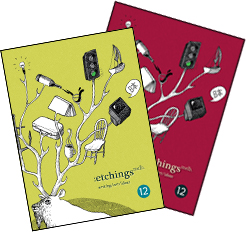lip lit: :etchingsmelb 12
For all the many thousands of words that make up the twelfth volume of :etchingsmelb, there is one word that perfectly sums it up: eclectic. The latest iteration of the literary journal skips merrily from the collage of Australiana that is the opening short story by Simonne Michelle-Wells, ‘Under a Dreaming Sky’, all the way through to Eddie Paterson’s stream-of-consciousness poetry on the last page. It is a deceptively thin magazine containing pieces that are in turn absurd, amusing, practical, thought-provokingly strange and disarmingly familiar.
:etchingsmelb 12 (subtitled ‘visualeyes’) is part-literary journal and part-lifestyle magazine—think something along the lines of marking your page in the latest issue of Meanjin with pages torn out of frankie. Writer Amanda Baker tackles the age-old Melbourne-versus-Sydney debate through the lens of cafe culture; lip’s very own Amy Nicholls-Diver interviews the director of sustainable fashion label Rummage Style, and both pieces take an almost academic approach to popular, consumer culture.
But the journal has a predominantly literary focus, with many innovative, experimental pieces of writing. The most distinctive piece is Romy Sai Zunde’s essay on her residency at the iconic bookshop Shakespeare & Co in Paris, ‘With Shakespeare, I Read Joyce (& Company).’ The subject matter is an automatic lure for literary nerds and chronic nostalgics like myself, but Zunde brings a critical eye to this sort of wanton romanticism while still managing to write an exceptionally poetic memoir of her time in Paris. She examines her distorted memories of the city by introducing the reader to fragments of her life there, such as receiving a letter from a Parisian friend: ‘Two pages of unedited nostalgia for the things we experienced together that moved us to creation. An insatiable appetite for books, pen-pushings on paper serviettes, and names plucked from a sea of faces…’. She slips back and forth between past and present tense, contradicts herself, and ultimately gives an accurate portrait on what it is like to love somewhere and leave it.
Allison Browning’s ‘A Penchant for the Theatre and the Perverse,’ investigates the performance art of avant-garde theatre collective Institute for the Art of the Actor. It is a particularly discomforting piece about the work of artists Roberta Bosetti and Renato Cuocolo. The artists perform their works in their own home, or in the homes of their audience. They read sections from their diaries, blindfold spectators, and frequently break the fourth wall to remind their audience/participants that everything they say has been scripted. Browning’s description of being blindfolded during a performance was so thoroughly unnerving I felt as though I was the one who had been blinded. Browning writes ‘[Their work] explores the disturbing effect of the unfamiliar in the familiar, of safety, of the untameable or uncontrollable in domesticity.
These sentiments echoed through my head as I read through the rest of the volume, reflecting on the uncanny, uncertain feeling provoked by the contents. Amra Pajalic’s memoir of domestic violence, ‘Woman on Fire,’ tells the story from the bewildered perspective of her childhood self. Fikret Pajalic’s work of fiction, ‘When I Am Dead and White,’ metaphorically explores the main character’s refugee experience through hyperactive sensory perception.
Long, slow consideration of :etchingsmelb 12 eventually led me to the conclusion that although surprising and seemingly disparate, what ultimately ties :etchingsmelb 12 together is the sense, in almost every piece, that there is something innately untrustworthy in what our senses try to tell us. This is true of the conventional six (with a particular focus on sight, as the volume’s subtitle directs the reader) but also to less obvious ‘senses’ like memory, morality, and reality. :etchingsmelb 12 is bizarre, and without a coherent theme, but sitting down to read it always provokes an anticipatory thrill for which there is no substitute. You only get that kind of thing from really good writing.


